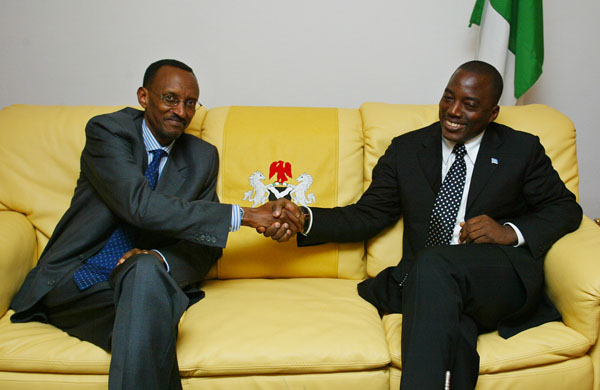
While most attention at the annual U.N. General Assembly in New York this week focuses on who’s saying what on the main stage, a host of significant meetings are taking place on the sidelines, where world leaders can conduct some speed-diplomacy on neutral turf. U.S. Secretary of State Hillary Clinton seized the opportunity to sit down with Presidents Joseph Kabila and Paul Kagame for an unannounced meeting on Monday to press both leaders to actively seek solutions to the end the conflict in eastern Democratic Republic of Congo.
"The secretary made no threats," said a senior U.S. official speaking to Reuters. "But it is important for Rwanda to cease any support for any groups operating against the government of the DRC, and it is important for the DRC government to take steps to protect all of its citizens."
The meeting may have also laid the groundwork for a high-level meeting between the two African presidents and other world leaders slated for Thursday. In a new Enough Project policy brief published today, authors Aaron Hall and Sasha Lezhnev urged leaders attending tomorrow’s meeting to use the forum to launch a “revitalized peace process” with the gravitas to make an impact where current regional efforts are coming up short.
Enough advocates for revitalizing the process to cover political, security, and economic issues, chaired by a high-level African mediator and with active engagement behind the scenes from the U.S., U.K., France, and Belgium to muster the necessary incentives and disincentives to spur progress.
The policy brief describes how governments in the region, convened by the 12-state International Conference on the Great Lakes Region, have since June sought to find a solution that would neutralize the Rwanda-backed M23 rebels and other armed groups destabilizing Congo’s volatile East. Congo has pushed and received some support in the region for the creation of an “international neutral force” to eradicate “negative forces”—a costly and logistically fraught concept, especially in light of the over 17,000-troop strong U.N. peacekeeping force already in place. Rwanda proposed a Joint Verification Mechanism to monitor the border between the two countries; that initiative is already being implemented, but it is “unlikely to succeed, given its very limited scope and maneuverability,” Hall and Lezhnev write.
Most importantly, the regional process hasn’t yet addressed the crucial underlying political and economic issues, such as the Congolese government’s inability to exert control over or provide services to the East, and the ongoing minerals smuggling between Congo and Rwanda. Ultimately, a sustainable solution to the conflict will also require acknowledgement of Rwanda’s backing of the M23 rebellion.
“The U.S. and other donors should condition approval for the $135 million World Bank general budget support to Rwanda on its cutoff of support to and dismantling of M23,” Hall and Lezhnev recommend. “The U.S. should delay the vote on this package until these conditions are met.”
"Eastern Congo stands at the precipice of disaster, but Thursday's meeting at the United Nations offers a chance to reignite a peace process between Congo and Rwanda to resolve their underlying political and economic interests,” said Sasha Lezhnev, Senior Congo Policy Analyst at Enough, in a press release.
Hall and Lezhnev lay out several recommendations for the internationally backed peace process to ensure that it addresses core issues and produces sustainable results, ranging from accountability for M23 commanders, to sanctions targeting key Rwandan officials implicated in the rebellion, to MONUSCO’s role in realizing the concept of the “neutral force” endorsed by some governments in the region.
"While the U.S. must continue to press Rwanda to end its support to M23, it must also put pressure on Congo to address continued failures of the state to provide basic governance and security,” said Aaron Hall, co-author and Enough Project Associate Director of Research. “The U.S. must also work with regional partners and the U.N. to create a process to address longstanding grievances between Congo and Rwanda. Military solutions alone will fail.”
Read the full brief “A Diplomatic Gambit: A Proposal for Moving Peace Talks Forward in Eastern Congo”
Photo: Presidents Kagame and Kabila (AP)

